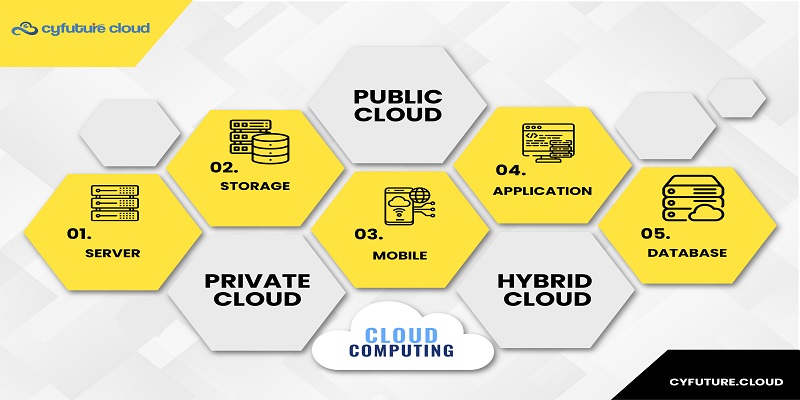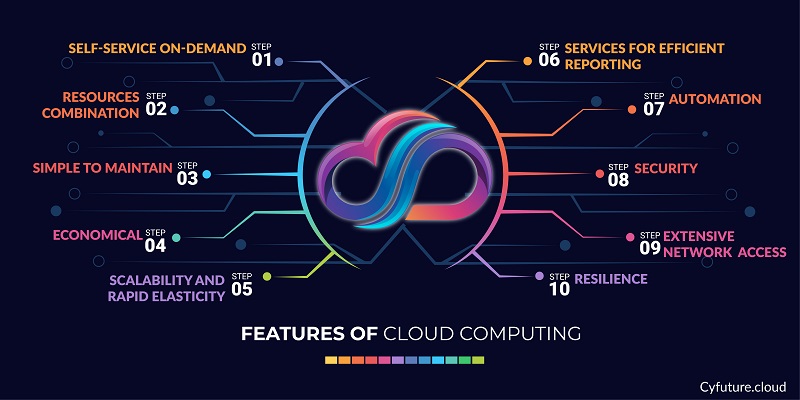Table of Contents
These days, cloud computing is highly well-liked. Businesses are growing all around the world because they rely so much on data. Data transfer and storage, a crucial requirement for any expanding firm, can only now be met by cloud computing.
Businesses can store and move a sizable pool of data from physical storage to a cloud location that can be accessed from anywhere using cloud computing.
Cloud computing has been used to operationalize on-demand, convenient, and all-encompassing network access to numerous computing resources.
In this blog, we will discover cloud computing features in detail.
Let’s get started!
| Visit Cyfuture.Cloud to learn more |
The Beginning of Cloud Computing
The term “cloud computing” covers a growing range of methods and resources. The core components of cloud computing are essentially the same across the board, though.This idea gained popularity because of AWS. One alternative to physical data storage infrastructure has emerged: cloud computing. This service was first offered by AWS in 2006. Soon after, Microsoft and Google followed this practice. Cloud services already cover everything from software to data infrastructure, different data models, and everything in between. Additionally, it comprises databases, specialized networking, IoT, serverless computing, business apps, data analytics, and many other elements.
Each component of cloud computing has its own advantages and disadvantages.
| Visit Cyfuture.Cloud to learn more |
Cloud computing: What is it?

An advanced area of technology that assists companies in meeting their IT needs is cloud computing. Every day, this technical service benefits both people and businesses. To get over the storage constraints of hardware devices and systems, everyone depends on reliable data storage services. Everyone requires a resource bank that can be accessed at any time and from any location.
Here’s where cloud computing comes into play. It gives customers a very practical and simple option for storing data inside a secure infrastructure. As a result, a lot of businesses increasingly rely on reliable cloud computing solutions.
Technology, principles, and architecture of cloud computing
When it comes to storing data, organizations need a strong architecture to fend off hostile attacks and data leaks. The greatest option for protecting data and sensitive information is cloud storage because it has strong technical barriers to prevent unauthorized access. To access the data, such infrastructure needs a secure internet connection.
Since almost everyone has access to the internet today, cloud storage is safe and convenient. Additionally, this storage system is trustworthy enough to guard against data breaches.
How is cloud computing implemented?
Nowadays, everyone prefers a cloud storage format for storing and transmitting data rather than using pen drives, hard discs, and SSDs. Services like cloud storage are crucial in a time when most people often switch between different devices. They can avoid the hassle of physically moving data from one device to another by having it stored in the cloud. Regardless of the device being used, the user must log in to access the stored data.
| Visit Cyfuture.Cloud to learn more |
Top 10 Features of Cloud Computing

1. Self-service on-demand
This is one of the most crucial and essential aspects of cloud computing. This indicates that clients may regularly check server capabilities, allocated network storage, and uptime. Consequently, it is one of the most important aspects because it enables users to administer various computing capabilities based on their requirements.
2. Resources Combination
Another fundamental characteristic of cloud computing By pooling resources, a cloud service provider can offer various services to multiple consumers based on their individual requirements. Resource pooling is an advantageous multi-client scheme for data processing, bandwidth services, and storage. The provider administers information that is saved in real time without interfering with the client’s data requirements.
3. Simple to maintain
This is one of the finest cloud characteristics. Cloud servers are easy to administer and have low impact. Cloud computing-driven resources are frequently updated to leverage their potential and capabilities. The updates are more compatible with the devices and operate quicker than the older versions.
4. Economical
This type of service is economical because it reduces IT expenses and data storage costs. Additionally, the vast majority of cloud computing services are free. Even if there are paid plans, they are typically economical and serve mainly to expand storage space. Utilizing cloud computing services has many advantages, including this one.
5. Scalability and rapid elasticity
The best aspect of cloud storage is how easily it can manage all storage-related workloads and data loads. Moreover, because cloud services are elastic, scalable, and automated, businesses and organizations can save a significant sum of money on manual labour and technical personnel. This is one of the primary advantages of cloud services.
6. Services for efficient reporting.
Cloud storage quickly and effectively offers a reporting service in case of any errors or issues, despite being entirely automated and run by bots. In addition, the back-end cloud services team responds promptly to user complaints regarding billing or functionality.
7. Automation
Automation is a crucial aspect of cloud computing. For optimal functionality, cloud services can configure, install, and restart themselves automatically. It is extremely user-friendly and reduces manual work. When deploying commands through the cloud infrastructure to organize the stored data, no human involvement is required.
8. Security
Cloud computing’s security is one of its finest characteristics. Customers rarely need to worry about content or data uploaded to Overcloud being copied or hacked. The stored information is not vulnerable to infections or Trojan horses. Even if the device is compromised, such harm cannot affect cloud data.
9. Extensive network access
A crucial aspect of cloud services is their pervasiveness. To access cloud storage, users require a computer or other internet-connected device. In addition, because cloud service providers have simple access to the network, they can easily manage all data uploaded to the cloud based on access time, latency, data output, and other variables.
10. Resilience
Resilience is the cloud service’s ability to recommence operations following a disruption. It depends on how rapidly servers, cloud databases, and the network infrastructure can recover from and restart any injuries or damage. There are no physical obstacles in the way of accessibility when something is resilient. As clients can access cloud services from a distance, location is not a barrier to their employment.
Key Features of Cloud Computing:
There are plenty of cloud computing features. We have listed a few cloud features below:
| Feature | Description |
|---|---|
| On-Demand Self-Service | Users can provision and manage resources without human intervention, via a user interface. |
| Scalability | Easily scale resources up or down based on demand, allowing flexibility and cost control. |
| Broad Network Access | Access services and resources over the internet from anywhere using various devices. |
| Resource Pooling | Resources are shared and dynamically allocated based on demand among multiple users. |
| Rapid Elasticity | Quickly expand or shrink resources to accommodate changing workloads or demands. |
| Measured Service | Usage of resources is monitored, controlled, and reported, enabling pay-per-use models. |
Conclusion
Cloud computing is the answer to everyone’s data storage problems, both for individuals and company owners. The use of cloud services is increasing at the same time that we continue to gather enormous amounts of data.
Aside from the physical systems’ storage constraints, data today is significantly more sensitive. This is the reason why businesses all over the world prefer cloud platforms to conventional data storage solutions. The primary benefit of using cloud storage is that, as long as you have a reliable internet connection, you can access it remotely from anywhere in the globe.
You can now get on-call consultation with Cyfuture Cloud! Grab the opportunity from the best Cloud Computing Service provider and grow miraculously. It is time you take the next step to success with Cyfuture Cloud.
FAQs
Q1. What is cloud computing?
Answer: Cloud computing is a technology that enables individuals and organizations to access and utilize computing resources (such as servers, storage, databases, networking, and software) via the internet, as opposed to relying on tangible hardware or on-premises servers.
Q2. What are the key benefits of cloud computing?
Answer: Key advantages of cloud computing include cost-efficiency, scalability, flexibility, accessibility from anywhere, automatic updates, and enhanced collaboration.
Q3. What are the different service models in cloud computing?
Answer: Cloud computing’s three primary service models are Infrastructure as a Service (IaaS), Platform as a Service (PaaS), and Software as a Service (SaaS).
Q4. What are the deployment models in cloud computing?
Answer: It has four deployment models: public cloud, private cloud, hybrid cloud, and multi-cloud.
Q5. How secure is cloud computing?
Answer: Cloud service providers apply strict security measures, such as encryption, access controls, and routine security audits. Users are also responsible for securing their own data and applications.
Q6. What is the difference between public and private?
Answer: A cloud service provider owns and administers a public cloud, while a single organization dedicates and can host a private cloud, either locally or through a cloud service provider.
Q7. How Can Cloud Computing Help Businesses Save Money?
Answer: Eliminates the need for an initial hardware investment, reduces maintenance expenses, and enables businesses to pay only for the resources they employ.
Q8. What is cloud storage?
Answer: The cloud storage service enables users to store and access their data via the internet. It offers a scalable and reliable data backup and recovery solution.
Q9. What Are Some Popular Cloud Computing Providers?
Answer: Amazon Web Services (AWS), Microsoft Azure, Google Cloud Platform (GCP), and IBM Cloud are among the most prominent cloud computing service providers.
Q10. Is cloud computing suitable for small businesses?
Answer: Yes, It is very advantageous for call centers. It offers cost-effective access to advanced technology, scalability to facilitate growth, and the ability to collaborate effectively.
Recent Post
Send this to a friend

 Server
Colocation
Server
Colocation CDN
Network
CDN
Network Linux
Cloud Hosting
Linux
Cloud Hosting Kubernetes
Kubernetes Pricing
Calculator
Pricing
Calculator
 Power
Power
 Utilities
Utilities VMware
Private Cloud
VMware
Private Cloud VMware
on AWS
VMware
on AWS VMware
on Azure
VMware
on Azure Service
Level Agreement
Service
Level Agreement 



















